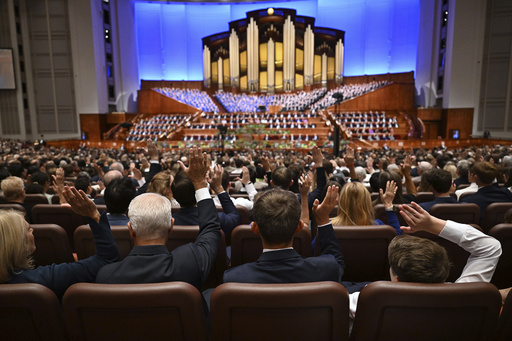In Salt Lake City, a top church official of The Church of Jesus Christ of Latter-day Saints, Dallin H. Oaks, used the platform of the faith’s general conference to encourage members to avoid engaging in harsh and hateful behavior during the ongoing election season. Oaks, who is a key adviser and potential successor to the current church president, emphasized the importance of fostering peace and unity within communities amidst the heightened political climate ahead of the upcoming November 5th election.
Addressing a congregation of 18,000 church members in Salt Lake City, with thousands more tuning in via livestream, Oaks highlighted the detrimental effects of contention, which he identified as being instigated by the devil and capable of inciting anger while hindering crucial policy advancements. He urged church members to embrace the role of peacemakers and to conduct themselves in a manner that aligns with the teachings of the faith.
While the leaders of The Church of Jesus Christ of Latter-day Saints maintain a stance of political neutrality, they occasionally offer guidance to members on navigating significant elections. With approximately 7 million of their 17 million global members residing in the United States, particularly in states like Arizona, Nevada, Utah, and Idaho, the influence of Latter-day Saints on the political landscape in these regions is noteworthy.
Historically, Latter-day Saints have been known to lean towards the Republican Party; however, the community has shown varying degrees of support for former President Donald Trump, with some expressing concerns over his controversial remarks and actions, which appear to contradict the core values upheld by the faith, such as humility, honesty, and compassion.
Seeking to sway Latter-day Saint voters in her favor, Vice President Kamala Harris has intensified efforts to engage with the community, particularly in states where their presence is significant. The Trump campaign has also mobilized to secure support from influential church members, emphasizing the protection of religious liberties as a key talking point.
In the lead-up to the election, individuals within the Latter-day Saints community exhibit a range of views and considerations in choosing their preferred candidate. While some prioritize issues such as abortion policy and support for Israel in their decision-making, others place emphasis on a candidate’s ability to foster unity and respect diversity.
As the election draws near, undecided voters and long-standing members alike assess the advice and counsel provided by church leaders, engaging in personal reflection and research to align their political choices with their individual values and beliefs. The general sentiment among church members is one of diversity in political opinion, with an understanding that each individual may interpret and apply the teachings of the faith in their own unique way to navigate the complex landscape of politics.


